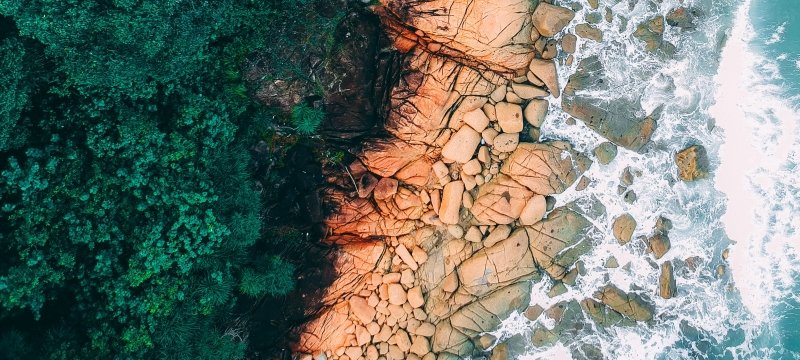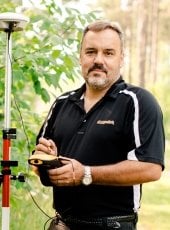Online Education for Working Professionals
Explore the principles of geospatial statistics and modeling.

Meet the demand for geospatial professionals and big data analytics experts.
Develop knowledge and skills in geospatial data analytics and information science.
Explore environmental geoscience, geospatial statistics, modeling and visualization,
predictive analytics, and remote sensing applications. Master industry standard tools,
such as ArcGIS, Python, and R. This certificate emphasizes data programming and analytics
in order to build skills for geoinformatics-related, data scientist, and geoscience
engineering jobs. Elevate your career in surveying and geoinformatics engineering,
forestry, civil and environmental engineering, social sciences, or business.
Request Info
How to Apply
3 courses in 3 semesters.
| Length |
3 courses in 2-3 semesters |
| Effort |
3 hours per credit per week |
| Each course |
3 credits |
| Total credits |
9 |
| Course type |
Online or on-campus |
| Modality |
Watch class recordings on demand |
| Cost |
Based on credits and course type |
| Already enrolled? |
Speak with your advisor |
Curriculum
Progress quickly with a compact curriculum. Work with the program advisor to select
courses that fit your interests and pre-requisite skills.
Electives
Take 9 credits of elective courses. Do not take both FW 5550 and SS 5049. Do not take
both FW 5555 and SS 5050.
GE 5280 - Python Programming in Geosciences
This course covers topics from Python programming basics to advanced tools and techniques for data processing and visualization in Geosciences. Students will learn in a hands-on environment with programming occurring interactively during class and assignments designed to strengthen the learning outcome.
- Credits:
3.0
- Lec-Rec-Lab: (2-0-1)
- Semesters Offered:
Fall
- Restrictions:
Must be enrolled in one of the following Level(s): Graduate
GE 5515 - Python for Geospatial Analysis
This advanced graduate-level course is designed to equip students with essential skills and techniques to perform geospatial data analysis using Python. This course emphasizes both theoretical concepts and hands-on practice, offering comprehensive insights into spatial data handling, visualization, statistical analysis, and application to real-world geospatial problems. Students will engage directly with real-world datasets through guided tutorials, comprehensive Jupyter notebook examples, and interactive classroom discussions.
- Credits:
3.0
- Lec-Rec-Lab: (2-0-1)
- Semesters Offered:
Spring
- Restrictions:
May not be enrolled in one of the following Class(es): Freshman, Sophomore, Junior
- Pre-Requisite(s): GE 5280
GE 5870 - Geostatistics & Data Analysis
This course covers the handling of spatial and temporal data for knowledge discovery. Major topics include spatial interpolation, clustering, association analysis, and supervised and unsupervised classification. Students will learn how to use geostatistical and pattern recognition tools for geoscience applications.
- Credits:
3.0
- Lec-Rec-Lab: (2-0-1)
- Semesters Offered:
Spring, in odd years
FW 5553 - Python for Modern GIS
An introduction to Python scripting and basic Python coding within ArcMap. Labs cover tasks found in typical GIS workflows. Students learn how to write and debug Python scripts, models and mapping programs.
- Credits:
3.0
- Lec-Rec-Lab: (2-0-3)
- Semesters Offered:
Fall
- Pre-Requisite(s): FW 5550 or FW 3540
FW 5550 - Geographic Information Science and Spatial Analysis
Use of geographic information systems (GIS) in resource management. Studies various components of GIS in detail, as well as costs and benefits. Laboratory exercises use ArcGIS software package to solve resource management problems.
- Credits:
4.0
- Lec-Rec-Lab: (3-0-3)
- Semesters Offered:
Fall, Spring
- Restrictions:
May not be enrolled in one of the following Class(es): Freshman, Sophomore, Junior
- Pre-Requisite(s): MA 2710 or MA 2720 or MA 3710
SS 5049 - GIS Applications for the Graduate Researcher
Applications of Geographic Information Science and Technologies for research problem identification, analysis, and dissemination. Students learn how to use GIS as a tool to collect and analyze qualitative and quantitative data for graduate research. Hands-on experience in data collection, analysis, and problem solving.
- Credits:
3.0
- Lec-Rec-Lab: (1-0-2)
- Semesters Offered:
Fall, in even years, Spring, in even years
- Restrictions:
May not be enrolled in one of the following Class(es): Freshman, Sophomore, Junior
FW 5555 - Advanced GIS Concepts and Analysis
This course moves beyond the fundamentals of GIS to explore the application of GIS technology to environmental monitoring and resource management issues. Students learn graphic modeling techniques, network analysis, 3D visualization, geodatabase construction and management, and multivariate spatial analysis.
- Credits:
3.0
- Lec-Rec-Lab: (2-0-3)
- Semesters Offered:
Spring
- Restrictions:
May not be enrolled in one of the following Class(es): Freshman, Sophomore, Junior
- Pre-Requisite(s): FW 5550
SS 5050 - Advanced GIS Methods and Projects
Advanced application of Geographic Information Systems in social sciences as a tool to collect and analyze qualitative and quantitative data. Students gain hands-on experience in data collection, advanced spatial analysis, and scripting.
- Credits:
3.0
- Lec-Rec-Lab: (1-0-2)
- Semesters Offered:
Fall, in odd years, Spring, in odd years
- Restrictions:
Permission of instructor required;
Must be enrolled in one of the following Level(s): Graduate
- Pre-Requisite(s): SS 5049
SU 5012 - Geospatial Data Mining and Crowdsourcing
This course comprises theory and applications of geospatial data mining. Typical application scenarios are covered. Attention is given to open-source data and systems crowdsourcing, as well as social media. Special focus on imaging and visual analytics.
- Credits:
3.0
- Lec-Rec-Lab: (0-2-1)
- Semesters Offered:
Spring
Typical Schedule
The minimum completion time is two semesters. Here are the semester offerings.
| Fall |
Spring |
GE 5280
FW 5553
FW 5550
FW 5555
SS 5049
SS 5050 |
GE 5515
GE 5870
SU 5012 |
Application Process and Admissions Requirements
Applications are reviewed on an individual basis using a holistic approach. Fill out
our free graduate application online to apply to any of our programs. Official transcripts and scores are not required
for the initial application, although you will need to upload them later.
Graduate School Admissions Process
Applying to the Graduate School is free (no application fees) and fast (no official transcripts, test scores, or letters needed to start). The application
process involves three easy steps.
See Admissions Steps
Graduate School Requirements
To be considered for admission to the Graduate School as a degree- or certificate-seeking student, you need to:
- have a bachelor's degree or its equivalent from an accredited institution, and
- be prepared for advanced study in your chosen field, as demonstrated by your previous
degree and your scholastic record.
See additional application requirements, including required materials:
Program Specific Requirements
Program Specific
- Admitted applicants typically have an undergraduate GPA of 3.0 or better on a 4.0
scale
- GMAT/GRE: Not required
International Students
- TOEFL: Recommended Score of 79 iBT
- IELTS: Recommended Overall Band Score of 6.5
Michigan Tech requires a minimum 79 overall TOEFL or 6.5 overall IELTS score.
Admissions Decisions
Made on a rolling basis.
Prospective Students
- Prospective students and non-degree seeking students interested in obtaining a graduate
certificate must apply to the certificate program using the online application.
- Accelerated certificate options exist for current Michigan Tech undergraduate students in good standing and have
achieved at least junior-level standing or recent bachelor’s graduates of Michigan
Tech (less than two years).
- The number of credits earned prior to admission that can be counted are restricted.
Current Graduate Students
- Current Michigan Tech graduate students who are in a degree program do not need to formally apply. Current students must still submit the appropriate degree schedule in order to complete the certificate.
International Student Requirements
International Students must apply and be accepted into a degree-granting program in order to earn a graduate certificate. A non-refundable $10 processing fee per application is required.
See International Applicants
Interested in taking a single, online course? Enroll as a non-degree seeking student.
Upon completion of the Certificate the student should be able to:
- Employ core concepts in geoinformatics, including computational components, data processing
and visualization features, and statistical functions in applications of geospatial
science in earth resource and environmental science settings.
- Properly use commercial tools (e.g., ESRI ArcGIS, Python) and/or equivalent user-developed
tools in applications of appropriate large-scale data analysis and visualization to
earth resource and environmental science related problems.
- Effectively communicate the results of data processing and the interpretations of
the resulting products.
Michigan Tech was founded in 1885.
The University is accredited by the Higher Learning Commission and widely respected
by fast-paced industries, including automotive development, infrastructure, manufacturing,
and aerospace. Michigan Tech graduates deliver on rapid innovation and front-line
research, leaning into any challenge with confidence.
The College of Engineering fosters excellence in education and research.
We set out as the Michigan Mining School in 1885 to train mining engineers to better
operate copper mines. Today, more than 60 percent of Michigan Tech students are enrolled
in our 17 undergraduate and 29 graduate engineering programs across nine departments.
Our students and curriculum embrace the spirit of hard work and fortitude our founders
once had. Our online graduate courses are the same, robust classes taken by our doctorate
and masters candidates, taught directly by highly regarded faculty, with outstanding
support from staff. We invite working professionals to join these courses, bring their
own experience and challenges as part of the discussion. Leverage the national reputation
of Michigan Tech to advance your career in tech leadership.
Online Certified Instructors
Meet the online certified instructors. Students have the flexibility to review class
recordings later.

Teaching Statement
Dr. Chatterjee teaches mine planning and design, geostatistics and data analysis, advanced geomechanics, resource and reserve estimation, and mine system reliability and optimization.
View Profile

Teaching Statement
Dr. Levin's teaching interests include Earth observation systems, geodesy, photogrammetry, geospatial technologies, global positioning systems, remote sensing, cartography, and much more.
View Profile

Teaching Statement
Dr. Xi teaches Introduction to GIS, Python Programming for Geosciences, and Python for Geospatial Analysis.
View Profile







